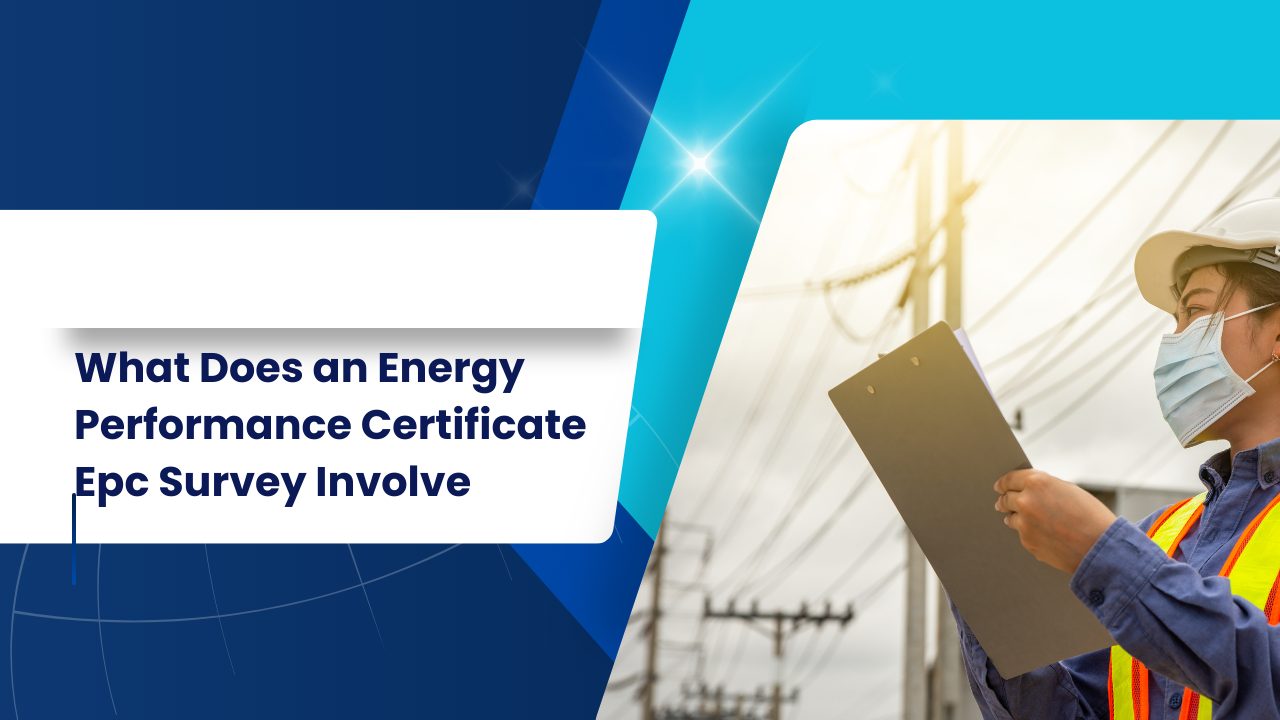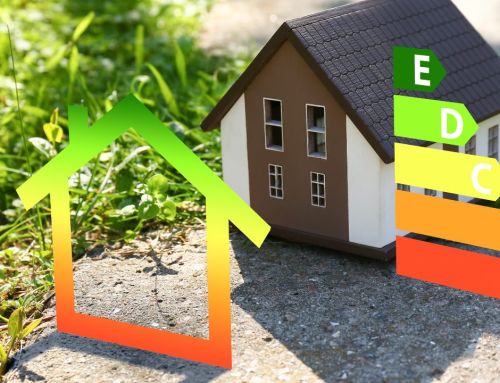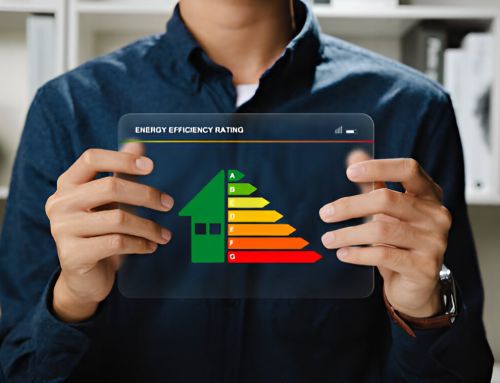
Exploring the world of Energy Performance Certificate (EPC) surveys, I was surprised to learn that nearly 20% of residential properties in the UK have the lowest EPC ratings (E-F).

The EPC survey process goes beyond just a thorough analysis; it involves a detailed examination of a property’s energy efficiency and environmental impact.
Curious to unravel the specifics of what this assessment entails? Let’s uncover the layers of an EPC survey and understand how it influences property values and sustainability efforts.
Understanding EPC Assessment Process
Regularly, the EPC assessment process involves an accredited assessor accessing the entire property to evaluate various energy efficiency factors. This includes a thorough property evaluation considering metrics such as age, construction, size, primary heating systems, insulation, secondary heat sources, lighting, and windows.
Through meticulous survey details, the assessor calculates energy efficiency insights to produce the final Energy Performance Certificate. Importantly, the assessment encompasses not only current energy usage but also potential energy cost estimation and manufacturer incentives for improvements. The assessor provides valuable guidance on enhancing energy performance, making it a critical step in understanding the property’s energy efficiency landscape.
How to Prepare for an EPC
To prepare effectively for an Energy Performance Certificate (EPC) survey, it’s important to make certain that all home improvement works have been completed beforehand. Make sure necessary documents, such as receipts and certificates for improvements like double glazing or insulation, are readily available.
Consider quick upgrades like switching to energy-saving light bulbs to boost energy efficiency. It’s important to grant the assessor easy access to the entire property during the assessment. Additionally, implementing simple energy-saving tips like sealing drafts and adjusting heating settings can positively impact your property’s energy performance.
By contacting a qualified domestic energy assessor and scheduling the survey promptly, you can streamline the process. Remember that no extensive property preparation is required, but having everything in order beforehand can aid in a smooth assessment.
EPC Validity and Potential Benefits
The Energy Performance Certificate (EPC) remains valid for a period of 10 years, serving as an important indicator of a property’s energy efficiency and potential benefits. Updating the EPC after making energy efficiency improvements can have a significant impact on property value and attractiveness to buyers.
A higher EPC rating not only showcases the property’s commitment to energy efficiency but also contributes to environmental sustainability by reducing energy consumption. Additionally, a well-rated EPC can lead to energy cost savings for the property owner over time.
Checking the EPC register for property rating information can provide insights into the property’s energy performance and help in making informed decisions regarding energy-efficient upgrades. Utilizing the benefits of an EPC, such as enhancing property value, promoting energy efficiency, and supporting environmental sustainability, can be advantageous for both current property owners and potential buyers looking for eco-friendly and cost-effective living spaces.
Booking Your EPC Survey

Updating your Energy Performance Certificate (EPC) after implementing energy efficiency improvements can greatly impact your property’s value and appeal to potential buyers. When booking your EPC survey, the process typically involves survey scheduling, property access, documentation requirements, energy-saving tips, and assessment duration.
To start, contact a qualified domestic energy assessor to schedule the survey at a convenient time. Make sure the assessor has full access to the property for a thorough evaluation. Have necessary documentation such as paperwork showing improvements like double glazing or insulation ready for review.
During the survey, consider energy-saving tips like using energy-efficient light bulbs. The assessment duration varies based on property size but generally lasts around an hour. Following the assessment, a few days are needed for calculations and report generation before receiving the official Energy Performance Certificate with the updated rating and energy performance advice.
Role of Cookies in Website Performance
In optimizing website performance, cookies play an essential role by tracking user interactions and providing valuable insights for enhancing user experience and analyzing key performance metrics. Performance cookies are utilized to understand and analyze key performance indexes of the website, assisting in delivering a better user experience for visitors. They provide valuable insights into website performance metrics.
Analytics cookies, on the other hand, help in understanding how visitors interact with the website, providing information on metrics like the number of visitors and bounce rate. These cookies also play an important role in measuring the effectiveness of marketing campaigns.
Additionally, uncategorized cookies are being analyzed and not yet classified into a specific category; it’s important to monitor and categorize them for transparency and compliance. By leveraging cookies analysis, websites can optimize user experience, track performance effectively, and gain valuable data insights to enhance overall website performance.
Key Factors in EPC Assessment

When conducting an Energy Performance Certificate (EPC) assessment, I meticulously evaluate key factors that directly impact the property’s energy efficiency rating. The property’s construction, including insulation type and quantity, plays an important role in determining energy efficiency. Additionally, the heating systems and controls, along with the lighting setup, are thoroughly assessed to gauge their impact on energy consumption. Window glazing type, such as single, double, or triple glazing, is carefully examined for its insulation properties.
In the assessment process, I focus on the property’s ventilation, energy-efficiency rating, and the types of light bulbs used, like compact fluorescent lamps (CFL), light-emitting diodes (LED), or fluorescents. Details such as the amount of insulation in the loft, wall types separating properties, and the installation date of glazing are all considered. Furthermore, I review boiler documentation, heat controls, thermostat settings, and any other heating sources like coal, gas, or log fires to provide a thorough evaluation of the property’s energy performance.
Post-Assessment Procedures and Information
After completing the Energy Performance Certificate (EPC) assessment, the assessor provides the property owner with a detailed Energy Performance Certificate (EPC) outlining various aspects of the property’s energy efficiency. The certificate includes insightful post-survey recommendations aimed at enhancing energy performance and reducing costs. It offers valuable EPC rating insights, indicating the property’s current energy efficiency standing. These insights can guide the implementation of energy-saving upgrades, which not only improve efficiency but also have a positive impact on the property’s value.
Frequently Asked Questions
Can I Request a Specific Time Slot for the EPC Assessment Appointment?
I can request a specific time slot for my EPC assessment appointment, ensuring time flexibility and customized scheduling. By discussing preferred assessment availability, I can arrange a specific time that suits my needs.
Are There Any Additional Costs Involved in Getting an Energy Performance Certificate?
When obtaining an Energy Performance Certificate, it’s important to take into account the cost breakdown. Hidden fees may impact budget considerations. Explore various payment options to mitigate the financial impact.
How Long Does It Typically Take to Receive the Official EPC Certificate After the Assessment?
Typically, the processing time for the official EPC certificate post-assessment is influenced by factors like property size and complexity. The average turnaround varies but generally takes a few days for calculations and report generation. Expedited delivery options may be available for quicker receipt of the EPC rating.
What Should I Do if I Disagree With the Energy Efficiency Rating Provided in the Epc?
If I object to the EPC rating, I can start an appeal process. An independent assessor can reassess. Energy-saving tips can improve the rating. Understanding the rating system and legal implications is essential for informed decisions.
Is There a Way to Expedite the Process of Updating an EPC After Making Energy Efficiency Improvements?
To expedite updating an EPC post-efficiency upgrades, engage a certified assessor promptly. Quick updates enhance energy savings, lead to an improved rating. Efficiency improvements guarantee accurate EPC. Seek professional guidance for best outcomes.
Conclusion
crucial –> essential
in conclusion –> to sum up
comprehensive –> thorough
in terms of –> regarding
To sum up, the Energy Performance Certificate (EPC) survey is a thorough assessment process that evaluates the energy efficiency of buildings based on various factors such as insulation, heating systems, and lighting. By understanding the intricacies of EPC ratings and the benefits they offer regarding energy savings and environmental sustainability, property owners can make informed decisions to improve the energy performance of their buildings.
The EPC survey plays an essential role in promoting energy efficiency and reducing carbon emissions in the built environment.
About the Author: LandlordCertificate
Related Posts
Get Social
Recent Posts
- Choosing the Right Consumer Unit for Fuse Box Installation London in Properties
- Electrical Diagnostic London: How Professional Testing Keeps Your Property Safe and Compliant
- Asbestos Management Survey London: Update Your Property Records
- Gas Safety Certificate London: Why Regular Checks Save Money Long-Term
- FRA London Explained: How a Professional Fire Risk Assessment Keeps You Compliant and Safe













